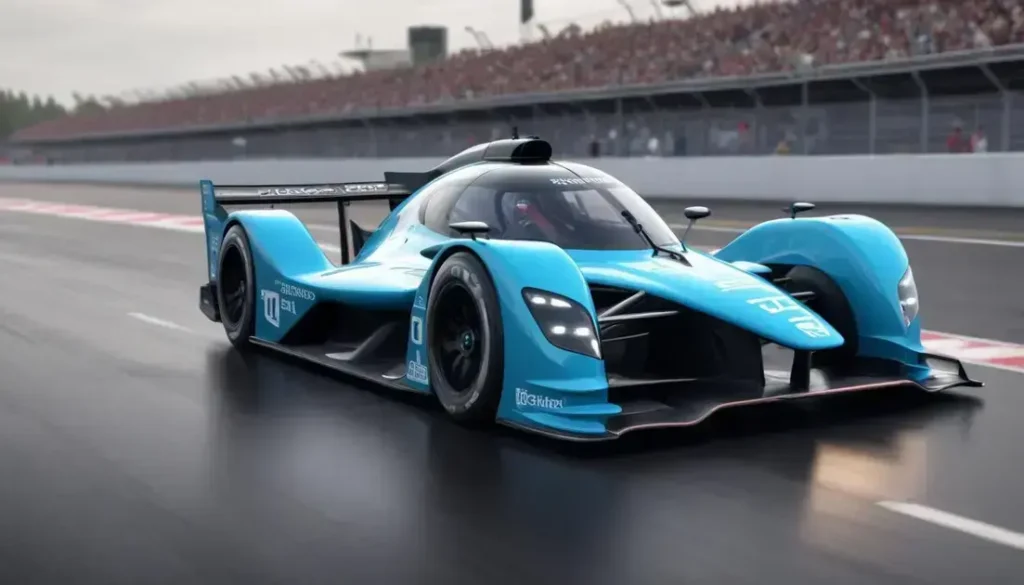Hydrogen racing utilises hydrogen fuel cells to power vehicles, offering a sustainable alternative that significantly reduces emissions while maintaining high performance, thus positioning itself as a key innovation in the motorsport industry.
Imagine a future where hydrogen powers the racetrack – that’s what Spark Racing Technology is bringing to life! Curious about the benefits?
Introduction to hydrogen racing
The world of hydrogen racing is rapidly evolving, presenting thrilling advancements in motorsport technology. This innovative approach harnesses the power of hydrogen fuel cells to propel high-performance racing cars, offering a cleaner alternative to traditional fossil fuels. With the ability to produce zero emissions, hydrogen racing paves the way for a more sustainable future in motorsports.
As teams like Spark Racing Technology lead the charge, they are showcasing the impressive capabilities of hydrogen-powered vehicles. These cars not only compete in speed but also push the boundaries of technological integration, featuring advanced systems that enhance performance. The use of hydrogen signifies a shift towards renewable energy sources, resonating well with environmentally conscious audiences.
Moreover, the integration of hydrogen fuel cells in racing vehicles creates new opportunities for innovation in engineering and design. Companies are exploring ways to optimise energy efficiency and performance, as the demand for sustainable solutions continues to rise. The implications of this technology extend beyond the racetrack, promising to influence the automotive industry significantly.
Background on Spark Racing Technology
Spark Racing Technology has emerged as a trailblazer in the world of hydrogen motorsport. This innovative company focuses on developing cutting-edge racing solutions that primarily utilise hydrogen fuel cells. Their commitment to sustainability not only enhances performance but also reduces the environmental impact of racing.
Founded with the vision of integrating renewable energy into competitive racing, Spark Racing Technology is at the forefront of this revolution. The use of hydrogen fuel in motorsports is a game-changer, allowing for high efficiency and performance while adhering to strict emission standards. As racing evolves, the focus is increasingly shifting towards greener technologies.
In collaboration with various partners, Spark Racing Technology has invested heavily in research and development. This ensures that their vehicles are not only competitive but also lead the way in engineering excellence. Their pioneering efforts are setting a new benchmark for the automotive industry, showcasing how cutting-edge technology can align with sustainability goals.
By promoting the viability of hydrogen-powered vehicles, Spark Racing Technology aims to inspire a new generation of racers and engineers. Their innovative approach paves the way for large-scale adoption of hydrogen technology, which could ultimately reshape the future of motorsports.
Performance metrics of the Pioneer 25
The Pioneer 25 represents a significant achievement in the realm of hydrogen racing, showcasing remarkable performance metrics that highlight its capabilities. With a focus on efficiency, this vehicle can reach impressive speeds while utilising hydrogen fuel cells, which offers a cleaner alternative to traditional fuels.
Equipped with advanced aerodynamics, the Pioneer 25 minimises drag, allowing for optimal speed on the racetrack. Its powerful electric motors, driven by hydrogen cells, enable rapid acceleration, making it a formidable competitor. This combination of engineering excellence and sustainable technology positions the Pioneer 25 at the forefront of motor racing innovation.
The performance metrics of the Pioneer 25 are not limited to speed. The vehicle also boasts exceptional energy efficiency, producing fewer emissions than conventional racing cars. This aligns with the growing demand for greener alternatives within the motorsport industry and exemplifies the potential of hydrogen technology.
Furthermore, rigorous testing has ensured that the Pioneer 25 meets high safety standards without compromising speed or performance. The integration of sophisticated telemetry systems provides real-time data to teams, enabling them to optimise performance during races. This detailed analysis paves the way for continuous improvements in future hydrogen racing designs.
Impact of hydrogen fuel cells in racing
The impact of hydrogen fuel cells in racing is both transformative and significant. These innovative power sources are reshaping the landscape of motorsport by providing a sustainable alternative to traditional gasoline engines. With hydrogen fuel cells, racing teams can achieve high performance without the damaging emissions associated with fossil fuels.
One of the key advantages of hydrogen fuel cells is their efficiency. They convert hydrogen into electricity through a chemical reaction, producing only water vapor as a byproduct. This breakthrough offers a long-lasting power source that enhances a vehicle’s range and performance on the track. Notably, the rapid refueling process of hydrogen is comparable to traditional refueling, allowing for minimal downtime during races.
The integration of hydrogen technology in racing also serves as a vital testing ground for innovations that could benefit broader automotive applications. As manufacturers develop more efficient fuel cell systems, insights gained from racing are likely to translate into advancements for everyday vehicles, promoting a greener automobile market.
Moreover, the success of hydrogen-powered racing cars can influence public perception, driving interest and investment in hydrogen technology. This growing enthusiasm may pave the way for a shift in how consumers view sustainable energy options in the automotive industry.
The role of women in hydrogen racing
The role of women in hydrogen racing is becoming increasingly pivotal as the motorsport industry evolves towards sustainability. Historically, motorsports have been male-dominated; however, the rise of hydrogen racing presents new opportunities for female professionals. Women are making their mark as engineers, drivers, and team leaders, showcasing their talents in a cutting-edge environment.
As hydrogen technology gains traction, teams are recognising the value of diverse perspectives. Women bring unique insights that can drive innovation and enhance team dynamics. This shift reflects a broader movement within the automotive industry that aims to promote inclusivity and equal representation.
Moreover, various initiatives and programs are being developed to empower young women interested in STEM (Science, Technology, Engineering, and Mathematics). These programmes foster skills that are essential in the advanced fields of hydrogen technology and racing. Women who pursue careers in these areas are inspired by role models in the industry, helping to bridge the gender gap.
The visibility of women in hydrogen racing not only enhances representation but also encourages a new generation of female engineers and drivers. As these trailblazers continue to push boundaries, they lay the groundwork for a more inclusive future in motorsports, reinforcing the idea that passion and talent know no gender.
Environmental implications of hydrogen racing
The environmental implications of hydrogen racing are profound and far-reaching. As the motorsport industry shifts towards sustainable practices, hydrogen emerges as a leading alternative to traditional fuels. This transition aims to significantly reduce greenhouse gas emissions while promoting cleaner racing technologies.
Hydrogen fuel cells generate power through a chemical reaction, producing only water vapour as a byproduct. This zero emissions profile means that hydrogen racing contributes positively to the environment by minimising air pollution associated with conventional racing fuels. Consequently, it supports the global effort to combat climate change and improve air quality.
Moreover, the adoption of hydrogen technology in racing sets an example for other industries. As racing teams showcase the viability of hydrogen as a fuel source, it encourages research and development in hydrogen infrastructure, such as refuelling stations. This potential expansion could facilitate broader acceptance of hydrogen vehicles in everyday transportation.
By championing clean energy solutions, hydrogen racing fosters public awareness and interest in sustainable practices. It inspires fans and future engineers alike to consider the environmental impact of their choices. The increasing visibility of hydrogen racing highlights the pressing need for innovation aimed at both performance and sustainability in the automotive sector.
Opportunities for Australian businesses
The rise of hydrogen racing opens up numerous opportunities for Australian businesses, particularly in sectors aligned with sustainable technologies and innovation. As the motorsport industry embraces hydrogen as a primary fuel source, Australian companies can take a leading role in this green transition.
Australian manufacturers are well-positioned to develop and supply advanced components for hydrogen fuel cell vehicles. This includes everything from fuel cells themselves to critical systems that support energy efficiency and performance. By investing in research and development, businesses can foster innovation and meet the increasing demand for sustainable racing solutions.
Furthermore, knowledge transfer from hydrogen racing can enhance local industries. Engineering firms can apply insights gained from motorsport to improve designs and technologies in other areas, such as public transportation and automotive manufacturing. This cross-pollination of ideas is essential for driving forward the national economy.
In addition, Australian companies could participate in international hydrogen racing events, showcasing their innovations on a global stage. This visibility can lead to partnerships and collaborations with international teams and technological organisations. As the world moves towards greener energy solutions, the Australian market stands to benefit significantly from this burgeoning trend.
Future of motorsports with hydrogen technology
The future of motorsports with hydrogen technology promises to be both exciting and transformative. As the industry shifts towards more sustainable practices, hydrogen is emerging as a pivotal player in revolutionising how racing is conducted. With its ability to produce zero emissions, hydrogen fuel not only enhances vehicle performance but also aligns with global efforts to combat climate change.
Hydrogen-powered vehicles are designed to deliver impressive acceleration and efficiency, challenging traditional gasoline engines in terms of performance. As manufacturers invest in research and development, innovations in hydrogen fuel cell technology are expected to enhance racing dynamics significantly. This technological advancement is likely to introduce higher speeds and improved handling characteristics, providing a thrilling experience for fans and drivers alike.
Moreover, integrating hydrogen technology into motorsports can serve as a catalyst for widespread adoption in commercial automotive applications. The racing scene often acts as a proving ground for innovations, allowing companies to refine their technologies in a competitive environment. Successful deployments in racing can translate to greater public acceptance and market readiness for hydrogen vehicles.
As audiences become increasingly environmentally conscious, the embrace of hydrogen in motorsports can elevate the sport’s appeal. A commitment to sustainability could attract new fans and sponsors, fundamentally reshaping the racing landscape while promoting a cleaner future.
Conclusion and industry outlook
The convergence of hydrogen technology and motorsports signifies a new era within the automotive industry. As we look towards the future, the ongoing advancements in hydrogen fuel cells are expected to reshape the competitive landscape of racing. The commitment to sustainability is key, appealing to a broader audience that values environmental responsibility.
With major investments from manufacturers, the infrastructure for hydrogen refuelling is likely to expand. This growth will support not only racing but also encourage the adoption of hydrogen vehicles in everyday life. As momentum builds, collaboration between racing teams and technology developers will drive innovation, enhancing vehicle performance and efficiency on the track.
Furthermore, the visibility of hydrogen racing can lead to increased consumer interest in green technologies, potentially attracting new sponsors and partnerships. Brands that align with sustainability will benefit from the positive association with hydrogen-powered motorsport, enhancing their market presence.
In conclusion, the future of the motorsport industry hinges on the integration of hydrogen technology. Embracing this shift not only positions racing at the forefront of innovation but also sets a precedent for sustainable practices across various sectors. The journey ahead promises exciting developments that could redefine both the racing world and the broader automotive landscape.
The Future of Hydrogen Racing
Hydrogen racing marks an important shift in the motorsport industry, focusing on sustainability and environmental responsibility. With innovations in hydrogen technology, racing not only becomes more exciting but also more eco-friendly.
As this technology continues to develop, it offers numerous opportunities for businesses involved in the automotive sector. By embracing hydrogen fuel cells, companies can lead the charge towards a greener future, attracting new fans and sponsors along the way.
Ultimately, the combination of thrilling competition and sustainable practices positions hydrogen racing as a frontrunner in the automotive evolution. This journey highlights the importance of innovation, collaboration, and a commitment to a sustainable future in motorsports.
As we move forward, it’s clear that hydrogen technology will play a crucial role in shaping the future of racing and the automotive industry overall.
Frequently Asked Questions
What is hydrogen racing?
Hydrogen racing involves using hydrogen fuel cells to power racing cars, offering a sustainable alternative to traditional fossil fuels while maintaining high performance.
How does hydrogen technology benefit the environment?
Hydrogen technology produces zero emissions at the point of use, significantly reducing air pollution compared to traditional gasoline engines and contributing positively to efforts against climate change.
What opportunities does hydrogen racing create for businesses?
Hydrogen racing opens up new markets for companies developing hydrogen technologies, components, and infrastructure, allowing them to lead in sustainable automotive solutions.
Can hydrogen technology be used outside of motorsports?
Yes, advancements made in hydrogen technology for racing can be applied to commercial vehicles, public transport, and other sectors looking to adopt cleaner energy solutions.
How can the public engage with hydrogen racing?
Fans can attend races, follow teams and events online, and support companies that are pioneering hydrogen technologies through their purchases.
What is the future outlook for hydrogen in the automotive industry?
The future looks promising as more manufacturers invest in hydrogen technologies, potentially leading to widespread adoption of hydrogen vehicles and infrastructure in the coming years.


